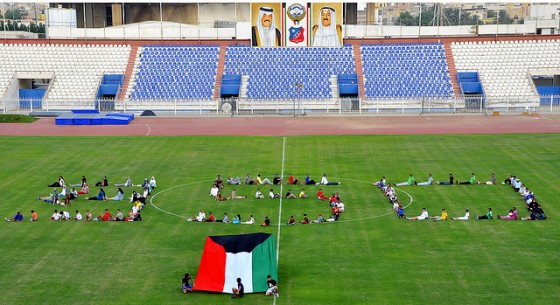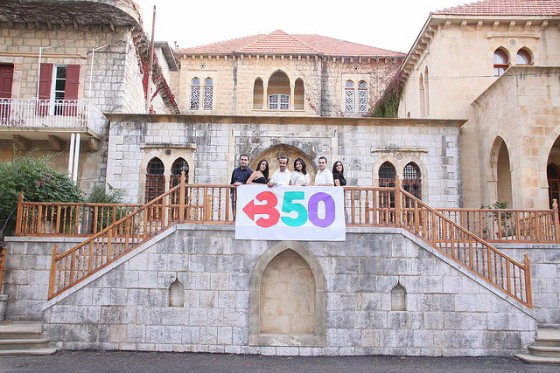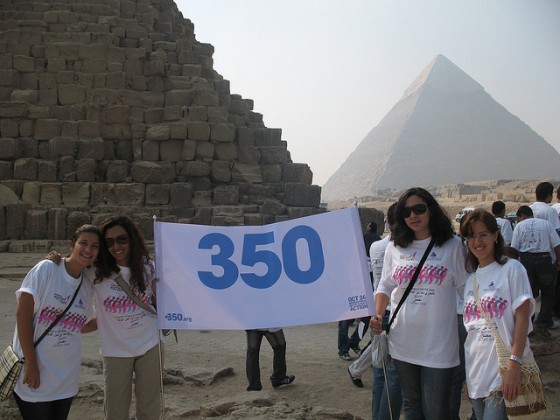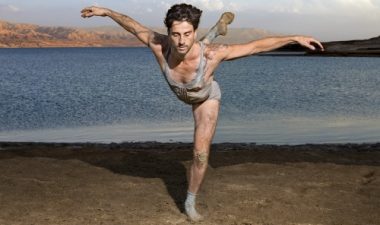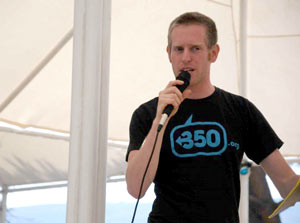 With a skype account and a compelling plan, Phil Aroneanu contacted organizers in just about every Middle Eastern country to amass an enormous 350.org following. Tafline asks him how it’s done:
With a skype account and a compelling plan, Phil Aroneanu contacted organizers in just about every Middle Eastern country to amass an enormous 350.org following. Tafline asks him how it’s done:
Until now, few people would have lumped community-centered environmental activism and the Middle East in the same sentence. But that stereotype is being flipped on its head thanks to 350.org, led by the renowned author Bill McKibben, author of “Deep Economy” and other important books.
One of the world’s most successful campaigns, 350.org has stretched its arms to every edge of the planet, including ours. Behind the Middle Eastern environmental scenes is Phil Aroneanu, an American with virtually no ties to the Middle East apart from his Jewish background.
So when the 350.org family decided to broaden its scope to include the rest of the world, equally implicit in and victim to the carbon scandal, Phil picked up his earphones and skyped all manner of development and environmental organizations throughout the Middle East. As a result, hundreds of concerned Jordanians, Israelis, Egyptians and others embraced 350.org’s important message: reduce carbon concentrations to 350 parts per million. Phil lets us in on the secret of the 350.org campaign, which, you’ll find, is no secret at all.
They’re organizing in Kuwait.
You have been an activist pretty much continuously since you were in high school. How did that come about? Is activism an Aroneanu genetic trait?
In a way, Activism is an Aroneanu trait. My grandparents grew up as Jews in Romania, survivied World War II, only to be forced to raise my parents under the brutal Ceaucescu regime. My parents came to the states when they were my age, and worked hard to give my sister and I a good life, education..etc. My upbringing was much more sane than any of my ancestors – I lived in the same relatively wealthy suburb of New York City for 18 years.
It was late in high school when I realized that there was much, much more than that life out there – and when I learned about climate change from a wacky physics teacher. I started up an environmental group and held the first “no car day” at our high school, when we got the local bagel shop to donate bagels, which we handed out to students who came to school on some alternative form of transport rather than a car.
Once I escaped to the broader world, I took a year before college to travel around and learn all about organic agriculture, renewable energy and sustainable living. I did it because it seemed to be exactly the opposite of what my parents wanted – suburban stability and consistency. I wanted excitement, back-to-the land and a new vision for a livable future in the face of climate change. Once I got to college, the pump was primed, and when I ran into Bill McKibben and others who felt the same way, we launched what would become 350.org.
Recently, my dad has been getting into making family trees, and discovered that our family does, in fact, have a radical political past. Dr. Aroneanu, my great great grandfather, was the outspoken chair of the Romanian socialist party, and was killed for his beliefs in the early 1900s, as well as some great great uncles. So, I guess I do have a venerable tradition of activism in my family, even though it may have skipped a few generations.
The 350 team has a long history that began with Middlebury College in Vermont, evolved into the Step it Up campaign, and has culminated in one of the largest such campaigns to ever exist. Tell us why your team has been so successful, and then, can you share some of the heartache you’ve experienced as well?
Our core team of 8, including Bill, has been campaigning together for over 7 years. We met as first-year students at Middlebury, and launched an ad-hoc student group called the Sunday Night Group. It wasn’t official, but we managed to mobilize hundreds of students on a campus of a couple thousand, and we got the administration to commit the college to carbon neutrality by 2016.
The success of that campaign, and the subsequent successes of Step It Up, 350 and other campaigns we’ve been involved with has a lot to do with the deep commitment and trust we have with each other. We more or less function as a board, strategists, organizers, and implementers of the strategy. There’s no disconnect between vounteer organizers who are putting on amazing events all around the globe, our engagement strategy, and the way that the media writes about the programs.
We’ve found that being radically transparent about the (lack of) resources we have and the amount of responsibility that we need from volunteers around the world to win this climate fight has contributed to the deep level of commitment among volunteer organizers, and the amount of effort they put in.
This is all to say that there’s no special sauce except for hard work, commitment and trust — that’s what powers any authentic movement on any issue.
One of your roles at the moment is to focus on mobilizing participants in the Middle East. Why are you the perfect candidate for this region, and what kinds of differences have you noticed between campaigning in your home country and here?
I honestly don’t think I’m the best candidate for the region. When we were starting 350.org, we only had 7 staff — our core team — and so we just decided to divide up the world into 7 pieces, and I was assigned the Middle East and Africa. Obviously, there’s no way that one American like me with almost no contacts in the region was going to make this happen, so I just started cold-calling environmental and development organizations in literally every country on those continents. I worked through networks, and by the time last year’s October 24 international day of action came around, we have over 300 events planned for the Middle East and another 300 planned in Africa.
The lesson here is that if your message and ask is broad enough, but you come with a compelling enough strategy, people will come on board. The beauty of 350.org is that it’s very simple – and that anybody can get involved and get together with people in their communities to do something good. Who doesn’t want to hang out with friends and neighbors for a day and feel like they’re part of something larger than themselves — a global movement?
In terms of differences – I have traveled extensively in the Middle East and parts of Africa, so I was expecting serious cultural differences. What I was actually surprised by was how many people in every country actually knew and were concerned about climate change from a variety of angles. In the Middle East and North Africa, water is perhaps the most important resource – and that’s what a lot of the events in the area focused on – and that’s what I talked about with organizers and individuals in that region.
Another lesson here is that it didn’t have to be me – it would have been anybody. All it takes is leadership, confidence, a plan, and a skype account with a bit of credit to launch a movement.
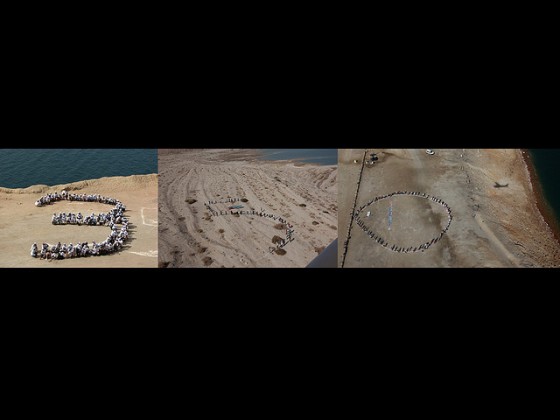 Israelis, Palestinians, and Jordanians along the Dead Sea shore.
Israelis, Palestinians, and Jordanians along the Dead Sea shore.
Many Middle Eastern countries participated in the recent Global Work Party event on 10-10-10. Can you give us a few examples of some of the projects that were most exciting or interesting? And were there any surprises, countries or types of projects that defied the status quo somehow?
We had hundreds of events in the Middle East as part of 10/10/10. In many parts of Palestine, for example, people planted trees to protect their cities and towns from sand storms and erosion. The Nablus cycling club (!) hosted a bike ride in that city, among the bombed-out houses and rubble-filled streets. There was a great 60-person bike ride in Israel that went from the Jordan River to the Dead Sea to highlight the shrinking of that critical water resource. In Cairo, organizers held a bike-rack design contest – the winning design will be build and installed in dozens of locations around the city. We had a handful of tree-plantings in Iran and a rally for solar energy at the University of Babylon in Iraq.
The thoughtfulness, concern and courage of these organizers — all of them working against the odds — is mindblowing. They get climate change and how it affects their lives, and they’re willing to speak out and get to work even as many of the governments frown on public engagement.
Speaking of status quo, Friends of the Earth Middle East (FoEME) arranged a bicycle tour to draw attention to the ailing Jordan river. This should have been a friendly event between Israeli, Jordanian, and Palestinian earth stewards, but Jordan pulled out, citing concerns that Israelis were attempting to infiltrate their impressionable youth. What are your reactions to this?
This was a tough one. We worked very hard with FoEME last year to put on an amazing event where people formed a 3, 5, and 0 on the banks of the dead sea in Jordan, Israel and Palestine, forming a sort of acrostic. This year’s bike ride would have been the icing on the cake, further cementing the fact that this is a cross-border, diverse movement. Clearly, there are often politics that are beyond our control – like the Israel/Palestine talks that were taking place half way across the world and likely contributed to the political theater that we saw in Jordan before 10/10.
My feeling is that the Jordanian critics could have chosen any event, climate related or not, to criticize, for their political gain – it was wrong and ignorant for the critics to deny the oppotunity for concerned citizens to go on a bike ride and highlight the important issue of water. Water and climate are inherently non-political. They are reality, and we are going to need to work together to create the solutions. Those people on both sides who want to use climate as a political football are just as bad as the climate deniers who want nothing more than to delay solutions and help fossil fuel corporations collect even more profits.
In a region brimming with oil, and with projects like Dubai’s Burj Tower, artificial islands, and the “global warming – themed” ice park in the UAE constantly popping up, what is the best tactic for convincing the populace that it’s necessary to reduce their appetite for carbon?
They’re going green in Cairo too. Which is good, because look at all that smog!
The oil Sheikhs in the Gulf know very well that their source of wealth is on the wane – oil will not flow indefinitely. That’s why they’re building cities like Masdar, putting up solar panels and diversifying their investment portfolios into real estate, finance…etc. Its a double-edged sword, of course. Like the coal barons of the United States, the oil families will do all they can do make as much money as possible in the short run before the world weans itself off of oil (sooner rather than later).
It’s our job as citizens, journalists, and civil society, to hold them accountable. We are borrowing from the future to make ourselves wealthy now, and the costs of our consumption are already being felt in Bangladesh, Tuvalu, sub-Saharan Africa and parts of the Middle East. But I do feel like people all over the world recognize that we’re out of control – and that we need to not only change our personal habits (that’s the easy part) but to redefine the way our civilization produces and consumes.
That’s going to take more than just switching light bulbs or driving less (both are needed badly) — it’s going to take a world war two size mobilization. We can learn from our grandparent’s generation – who lived through WWII – what that means.
Finally, do you have any final encouraging or inspiring words for our readers?
It’s entirely possible that we won’t win this fight – and that the planet will be permanently damaged, making it very human-unfriendly. But, there’s also a slim chance that civilization will come out on the other side of this. We can either make a fight of it, band together and be a part of a movement to solve the largest crisis human kind has ever faced, or we can take it lying down, and let our kids and grandkids deal with the fallout. I’m organizing because I feel like we should put up a fight – but I can’t do it alone in the US or in the Middle East. We need everybody on the planet to commit to reduce carbon in their own lives, but also to go beyond that and take political action to make sure our leaders get the message and don’t just take the easy way out.
All images via 350.org
More stories about Bill McKibben and 350.org:

